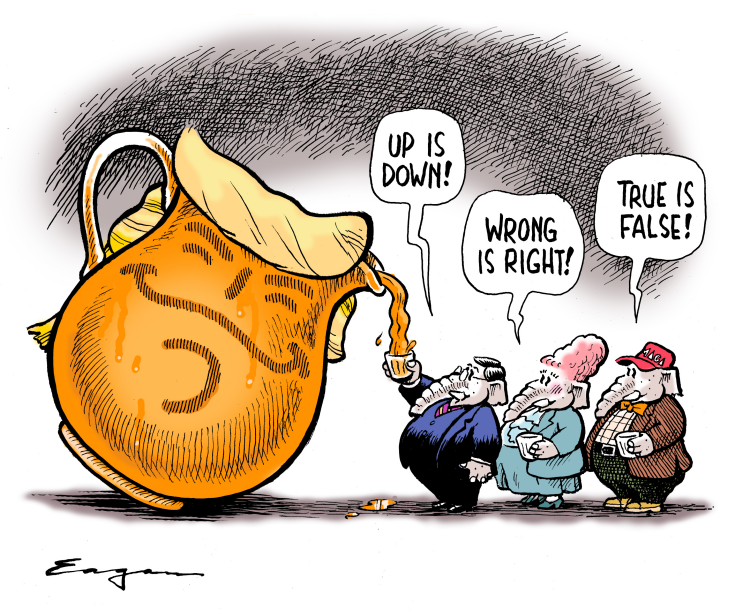odanny
Diamond Member
Normal, educated people listen to Trump lie repeatedly and wonder what the hell is wrong with the guy. How can someone lie so prolifically? A few educated professionals whose job it is to understand aberrant behavior weigh in.
To the Editor:
Donald Trump never apologizes, acknowledges a mistake or appears to reflect on his role in the creation of his recurrent difficulties.
As a practicing mental health professional for over 40 years, I believe that people can change, but I also know it is often difficult and painful work, sometimes requiring a therapist to help illuminate why one keeps finding oneself in the same kind of quandary.
This is the central problem that other mental health experts and I addressed in our 2017 book “The Dangerous Case of Donald Trump” and is what makes him unfit to hold high office. He has to be right, never needs to learn from his mistakes, and must protect his inflated and fragile self-image above all else, including the nation’s security.
He is always the victim, never having had a hand in the creation of his own dilemmas.
Leonard L. Glass
Newton, Mass.
The writer is an associate professor of psychiatry at Harvard Medical School.
To the Editor:
Efforts to find a “logical” or even minimally reasonable explanation for human behavior tend to run into a stone wall, especially when the behavior clearly defies ordinary logic. Donald Trump’s handling of classified documents and his response to government efforts to reclaim them arguably fall within this category.
I would suggest a different approach: a consideration of what might be going on deeper inside Mr. Trump psychologically, below the realm of logic and conscious reason.
Think of a child’s beloved stuffed animals, commonly known in psychoanalytic terminology as “transitional objects.” In theory, the transitional object provides a child with a fantasied connection to the safety provided by the “mother” that is increasingly threatened as normal development and separation occur.
However, transitional objects may also serve perverse or negative functions, such as maintaining the fantasy of unlimited, grandiose power. And the need for that imagined power may be seen as an attempt to counter deep feelings of weakness and vulnerability.
Mr. Trump’s behavior in protecting his transitional objects (in this case the documents) shows all the characteristics of a child’s response when the beloved stuffed animal is lost or taken away. Anxiety and rage are almost instantaneous. Desperate attempts to retain or restore the transitional objects follow. It may be helpful to reconsider Mr. Trump’s behavior as primitive, regressive and best understood outside the parameters of adult thinking.
Priscilla F. Kauff
New York
The writer is a clinical professor of psychology in psychiatry at Weill Medical College.

 www.nytimes.com
www.nytimes.com
To the Editor:
Donald Trump never apologizes, acknowledges a mistake or appears to reflect on his role in the creation of his recurrent difficulties.
As a practicing mental health professional for over 40 years, I believe that people can change, but I also know it is often difficult and painful work, sometimes requiring a therapist to help illuminate why one keeps finding oneself in the same kind of quandary.
This is the central problem that other mental health experts and I addressed in our 2017 book “The Dangerous Case of Donald Trump” and is what makes him unfit to hold high office. He has to be right, never needs to learn from his mistakes, and must protect his inflated and fragile self-image above all else, including the nation’s security.
He is always the victim, never having had a hand in the creation of his own dilemmas.
Leonard L. Glass
Newton, Mass.
The writer is an associate professor of psychiatry at Harvard Medical School.
To the Editor:
Efforts to find a “logical” or even minimally reasonable explanation for human behavior tend to run into a stone wall, especially when the behavior clearly defies ordinary logic. Donald Trump’s handling of classified documents and his response to government efforts to reclaim them arguably fall within this category.
I would suggest a different approach: a consideration of what might be going on deeper inside Mr. Trump psychologically, below the realm of logic and conscious reason.
Think of a child’s beloved stuffed animals, commonly known in psychoanalytic terminology as “transitional objects.” In theory, the transitional object provides a child with a fantasied connection to the safety provided by the “mother” that is increasingly threatened as normal development and separation occur.
However, transitional objects may also serve perverse or negative functions, such as maintaining the fantasy of unlimited, grandiose power. And the need for that imagined power may be seen as an attempt to counter deep feelings of weakness and vulnerability.
Mr. Trump’s behavior in protecting his transitional objects (in this case the documents) shows all the characteristics of a child’s response when the beloved stuffed animal is lost or taken away. Anxiety and rage are almost instantaneous. Desperate attempts to retain or restore the transitional objects follow. It may be helpful to reconsider Mr. Trump’s behavior as primitive, regressive and best understood outside the parameters of adult thinking.
Priscilla F. Kauff
New York
The writer is a clinical professor of psychology in psychiatry at Weill Medical College.

Opinion | What Makes Trump Act That Way? A Psychiatrist and a Psychologist Weigh In. (Published 2023)
Mental health professionals offer explanations. Also: Protecting the ex-president; sealing criminal records; compassionate doctors; sex and the G.O.P.

